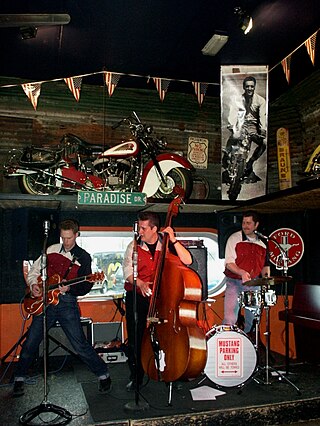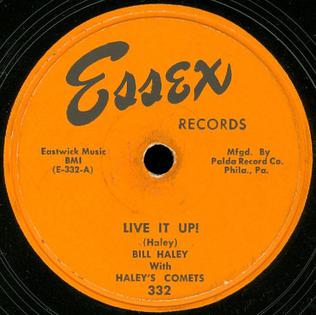
William John Clifton Haley was an American rock and roll musician. He is credited by many with first popularizing this form of music in the early 1950s with his group Bill Haley & His Comets and million-selling hits such as "Rock Around the Clock", "See You Later, Alligator", "Shake, Rattle and Roll", "Rocket 88", "Skinny Minnie", and "Razzle Dazzle". Haley has sold over 60 million records worldwide. In 1987, he was posthumously inducted into the Rock and Roll Hall of Fame.

"Rock Around the Clock" is a rock and roll song in the 12-bar blues format written by Max C. Freedman and James E. Myers in 1952. The best-known and most successful rendition was recorded by Bill Haley & His Comets in 1954 for American Decca. It was a number one single for two months and did well on the United Kingdom charts; the recording also reentered the UK Singles Chart in the 1960s and 1970s.

Bill Haley & His Comets was an American rock and roll band formed in 1947 and continuing until Haley's death in 1981. The band was also known as Bill Haley and the Comets and Bill Haley's Comets. From late 1954 to late 1956, the group recorded nine Top 20 singles, one of which was number one and three that were Top Ten. The single "Rock Around the Clock" was the best-selling rock single in the history of the genre and maintained that position for several years.

Rockabilly is one of the earliest styles of rock and roll music. It dates back to the early 1950s in the United States, especially the South. As a genre, it blends the sound of Western musical styles such as country with that of rhythm and blues, leading to what is considered "classic" rock and roll. Some have also described it as a blend of bluegrass with rock and roll. The term "rockabilly" itself is a portmanteau of "rock" and "hillbilly", the latter a reference to the country music that contributed strongly to the style. Other important influences on rockabilly include western swing, boogie-woogie, jump blues, and electric blues.

Rudolph Clement Pompilii was an American musician best known for playing tenor saxophone with Bill Haley and His Comets. He was usually credited under the alternate spelling Rudy Pompilli and occasionally as Rudy Pell.

Marshall Edward Lytle was an American rock and roll bassist, best known for his work with the groups Bill Haley & His Comets and The Jodimars in the 1950s. He played upright slap bass on the iconic 1950s rock and roll records "Crazy Man, Crazy", "Shake, Rattle and Roll", and "Rock Around the Clock".
Holiday Records was an American record label based out of Philadelphia, Pennsylvania which was active in the early 1950s. Owned by Dave Miller, who also owned Essex Records, it is best known for releasing some of the earliest recordings widely identified as rock and roll, most notably "Rocket 88" by Bill Haley and His Saddlemen in 1951.

"Crazy Man, Crazy" was the title of an early rock and roll song written by, and first recorded by Bill Haley & His Comets in April 1953. It is notable as the first recognized rock and roll recording to appear on the national American musical charts, peaking at #12 on the Billboard Juke Box chart for the week ending June 20, 1953, and #11 for two weeks on the Cash Box chart beginning for the week of June 13.
Donato Joseph "Danny" Cedrone was an American guitarist and bandleader, best known for his work with Bill Haley & His Comets on their epochal "Rock Around the Clock" in 1954.

"Rock the Joint", also known as "We're Gonna Rock This Joint Tonight", is a 1949 boogie song recorded by various proto-rock and roll singers, notably Jimmy Preston and early rock and roll singers, most notably Bill Haley in 1952. Preston's version has been cited as a contender for being "the first rock and roll record", and Haley's is widely considered the first rockabilly record.

Rock with Bill Haley and the Comets is an early rock and roll music compilation album issued by Essex Records in December 1955, and featuring music by the titular group, Bill Haley & His Comets. The album features recordings made by Haley in 1952 and 1953, including his hits, "Rock the Joint", "Crazy Man Crazy", "Fractured", and "Live It Up".

Bill Haley and His Comets is the title of the tenth album of rock and roll recordings by Bill Haley & His Comets. Released in April 1960, it was the band's first album release for Warner Bros. Records, following their departure from Decca Records at the end of 1959. The recordings were produced by George Avakian, who succeeded Haley's Decca producer, Milt Gabler.

"Skinny Minnie" is a 1958 song co-written and recorded by Bill Haley and his Comets. The song was released as a Decca single which became a Top 40 chart hit in the U.S., peaking at #22 on the Billboard chart.

"Rock-A-Beatin' Boogie" is a 1952 song composed by Bill Haley and first recorded by the Esquire Boys in 1952. Bill Haley and the Comets recorded the song in 1955 for Decca. The song was featured in the 1956 movie Rock Around the Clock.
Bill Haley & His Comets recorded many singles and albums. The following list references only their original release and generally does not include compilation albums or single reissues. This list does not include releases on which the Comets worked as session musicians, and primarily focuses on releases during Haley's lifetime.

"Two Hound Dogs" is a 1955 rock and roll song composed by Bill Haley and Frank Pingatore. The song was released as a Decca single by Bill Haley and His Comets. The Decca single peaked at #31 on the Cash Box singles chart.

"Real Rock Drive" was the title of an early rock and roll song written by, and first recorded by Bill Haley & His Comets under the name Bill Haley with Haley's Comets in 1952. The song was released as an Essex Records 78 single.
"Fractured" was the title of an early rock and roll song written by Bill Haley and Marshall Lytle and first recorded by Bill Haley & His Comets, then going by the name Bill Haley with Haley's Comets, in 1953. The song was released as an Essex Records 78 single in 1953, peaking at #24 on the Billboard singles chart.

"Live It Up" was the title of an early rock and roll song written by Bill Haley and first recorded by Bill Haley & His Comets under the name Bill Haley with Haley's Comets in 1953. The song was released as an Essex Records 78 single in 1953, peaking at #25 on the Billboard singles chart

"R-O-C-K" is a 1956 rock and roll song recorded and co-written by Bill Haley and released as a Decca single. The song appeared in the 1956 Columbia Pictures movie Rock Around the Clock. The single peaked at #16 on Billboard.
















